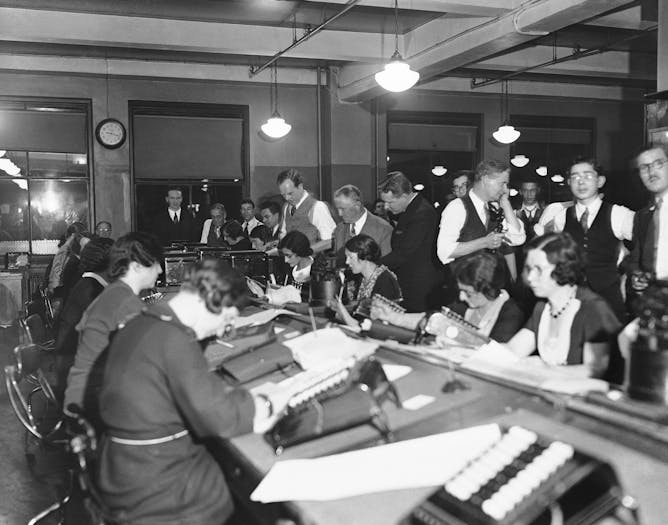|
|
|
|
You want to know who won. It’s Election Day, and it doesn’t matter if you’re an American in the U.S. or a curious onlooker overseas, you just want to know who won. Right now, if possible. Or at least immediately after the polls close, if not sooner.
It’s been this way for more than a century – and media outlets have been feeding the public’s desire with dazzling election night spectacles since the 1800s, as Indiana University journalism scholar Mike Conway explains. But whereas in the past the focus has been on polling, predictions and quick results, this year could be very different.
Also today:
|
Jeff Inglis
Politics + Society Editor
|

|
|

Journalists, like these Associated Press staffers, have always worked hard to report election results quickly – and accurately.
AP Photo
Mike Conway, Indiana University
Journalists want to be first to tell the public who won, but the 2020 election night news frenzy may be very different from past years' coverage.
|
Science + Technology
|
-
Craig Robert Martin, Massachusetts Institute of Technology
Earth's magnetic field locks information into lava as it cools into rock. Millions of years later, scientists can decipher this magnetic data to build geologic timelines and maps.
-
Sam Goree, Indiana University
Design bloggers have long had creeping suspicion of a more monolithic web, so a team of researchers decided to analyze the aesthetics of nearly 10,000 websites.
|
|
Arts + Culture
|
-
Lori Kogan, Colorado State University; Shelly Volsche, Boise State University
Since women see men who own pets more favorably, you'd think online daters with cats in their profile pics would get more matches...
-
Brian Fagan, University of California Santa Barbara
Today's beds are thought of as bastions of privacy. But not long ago, they were the perches from which kings ruled and places where travelers hunkered down with complete strangers.
|
|
Health
|
-
Michelle Sconce Massaquoi, University of Oregon
Finally, an answer to a long-bubbling question: What works best – bar or liquid soap?
-
Monica Gandhi, University of California, San Francisco
Death rates for hospitalized COVID-19 patients fell from 25.6% in March to 7.6% in August, according to a new study on three hospitals in New York. A study in the U.K. found similar results.
-
Simon F. Haeder, Penn State; Sarah E. Gollust, University of Minnesota
Health policy and politics scholars expect political fallout from the federal response to the pandemic will play out for years, with trust in government taking a big hit.
|
|
Economy + Business
|
-
Thomas Martin, College of the Holy Cross
In ancient Athens, the richest people paid taxes to support what the residents considered the salvation of the city. These taxes earned them social and political clout more valuable than money.
|
|
Ethics + Religion
|
-
Julie Hanlon Rubio, Association of Theological Schools
The Vatican has clarified that Pope Francis' support of civil unions did not change church doctrine. A theologian explains what Francis is doing is departing from Catholic rhetoric on the family.
|
|
Education
|
-
Lucy (Kathleen) McGoron, Wayne State University; Julie Wargo Aikins, Wayne State University
Schools can impact the mental health and well-being of not just students but their parents, too.
|
|
From our international editions
|
-
Duncan McDonnell, Griffith University; Stefano Ondelli, University of Trieste
Populists leaders are supposed to use simpler language than their opponents. A comprehensive study shows this is not always the case.
-
Peggy Nash, Ryerson University
A Trump loss on Nov. 3 would demonstrate that the grassroots organizing of American women has paid off.
-
Matt Wall, Swansea University; Allaina Kilby, Swansea University; Richard Thomas, Swansea University
Punters are more cautious than the polls, suggesting this election might be closer than the media is reporting.
|
|
| |
| |
| |
| |
| |
| |
|
|
|
|
|
|
|